6 Nutrients That Heal Leaky Gut Syndrome
Leaky gut syndrome is extremely pervasive in our society and many people are suffering with this condition and do not know it. Do you experience symptoms including brain fog, acne, weight gain, allergies, nutrient deficiency, hormonal or mood imbalances?
If the answer is yes to any of these symptoms you may benefit from 6 nutrients that heal leaky gut syndrome. In this article, I go over some of the most research proven compounds that are effective at repairing the gastrointestinal tract and help to heal leaky gut.
The modern Western diet is not only lacking in critical nutrients which promote gut health but the high amount of sugar, processed foods and alcohol consumed decreases the percentage of healthy compounds which our bodies can absorb for use. Many of the above mention symptoms are side effects of inflammation and trauma to the gut linked to autoimmune dysfunction.
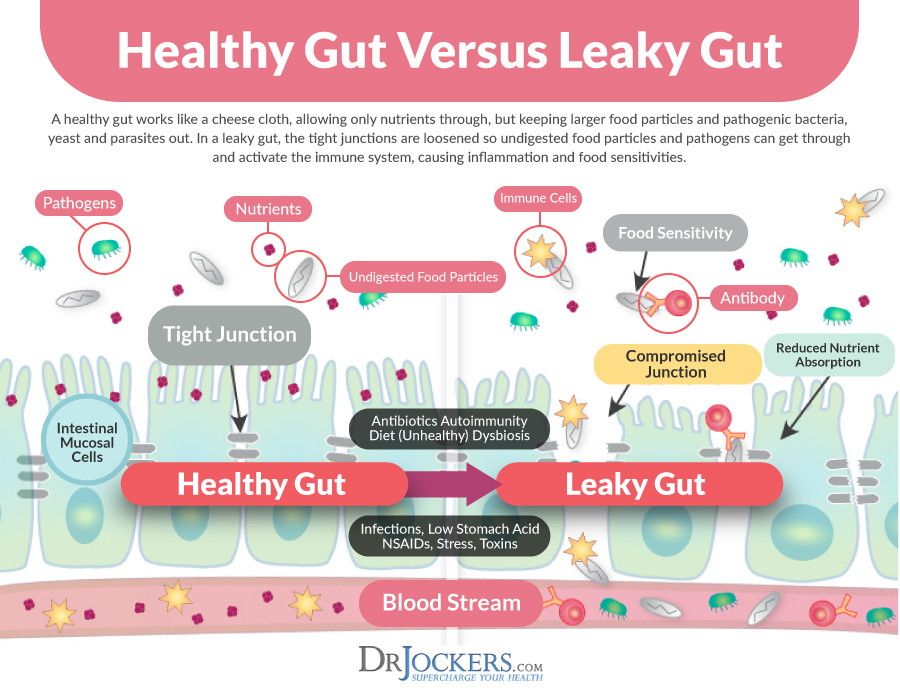
What is Leaky Gut Syndrome?
Leaky gut syndrome is one of the major factors in nearly every inflammatory condition. Most people have this condition but no very little about it.
The digestive tract is loaded with trillions of microorganisms that form a natural ecosystem commonly called the gut flora. This ecosystem is designed to be symbiotic in that it benefits both the individual and the microbes. Certain lifestyle stressors, as described in the image above, throw off the natural symbiosis between us and the microbial life in the gut.
When we develop this imbalance, it causes a rise in pathogenic microbes, chronic gut inflammation and damage to the gut lining. When this happens it can cause a condition known as intestinal permeability or leaky gut syndrome.
In order to heal and protect future damage to our gut it is very important that we follow a healthy lifestyle and eat foods that are good for the gut, have great sleep habits and keep stress under control. In addition, there are several key nutrients that play a vital role in helping to heal leaky gut syndrome.
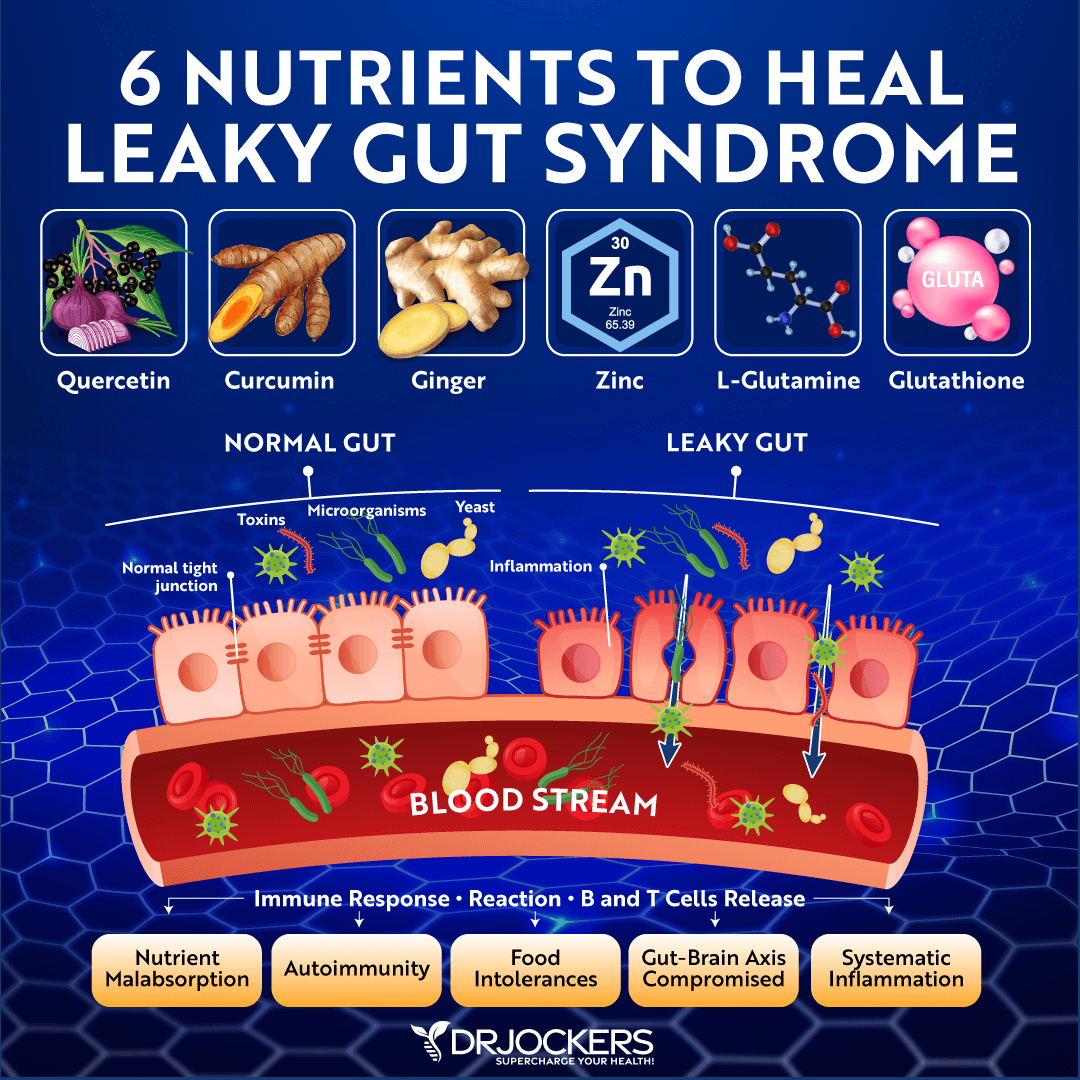
1. Quercetin
The healing effects of quercetin have not been shown to exist in any synthetic drug on the market to date. Quercetin supports a proper immune response by reducing macrophages during situations of over production as seen in autoimmune conditions. However, unlike many drugs, quercetin does not adversely affect the release of inflammatory cells required to fight infectious agents like cancer cells. In fact, quercetin stimulates apoptosis (cell death) in cancer cells. Within the digestive tract, quercetin improves the tight junction barriers lined by proteins (8). (1)
Another healing power of quercetin is its ability to control oxidative damage to tissue. Quercetin prevents the release of histamine from cells associated with inflammation and systemic reactions which may manifest as allergies. Quercetin also improves the concentration of glutathione which is referred to as our body’s master antioxidant. Combined with other foods like pineapple that contains bromelain, quercetin has a synergistic response to enhancing immunity and reducing inflammation. (2, 3)
Dietary sources of quercetin can be found in apples, capers, onions as well as berries, herbs like parsley, sage and even green tea (2, 3). Consuming 400-1,200 mg/day of supplemental quercetin is recommended to naturally aid in the prevention of inflammation and improve the gut’s ability to heal (1, 4).
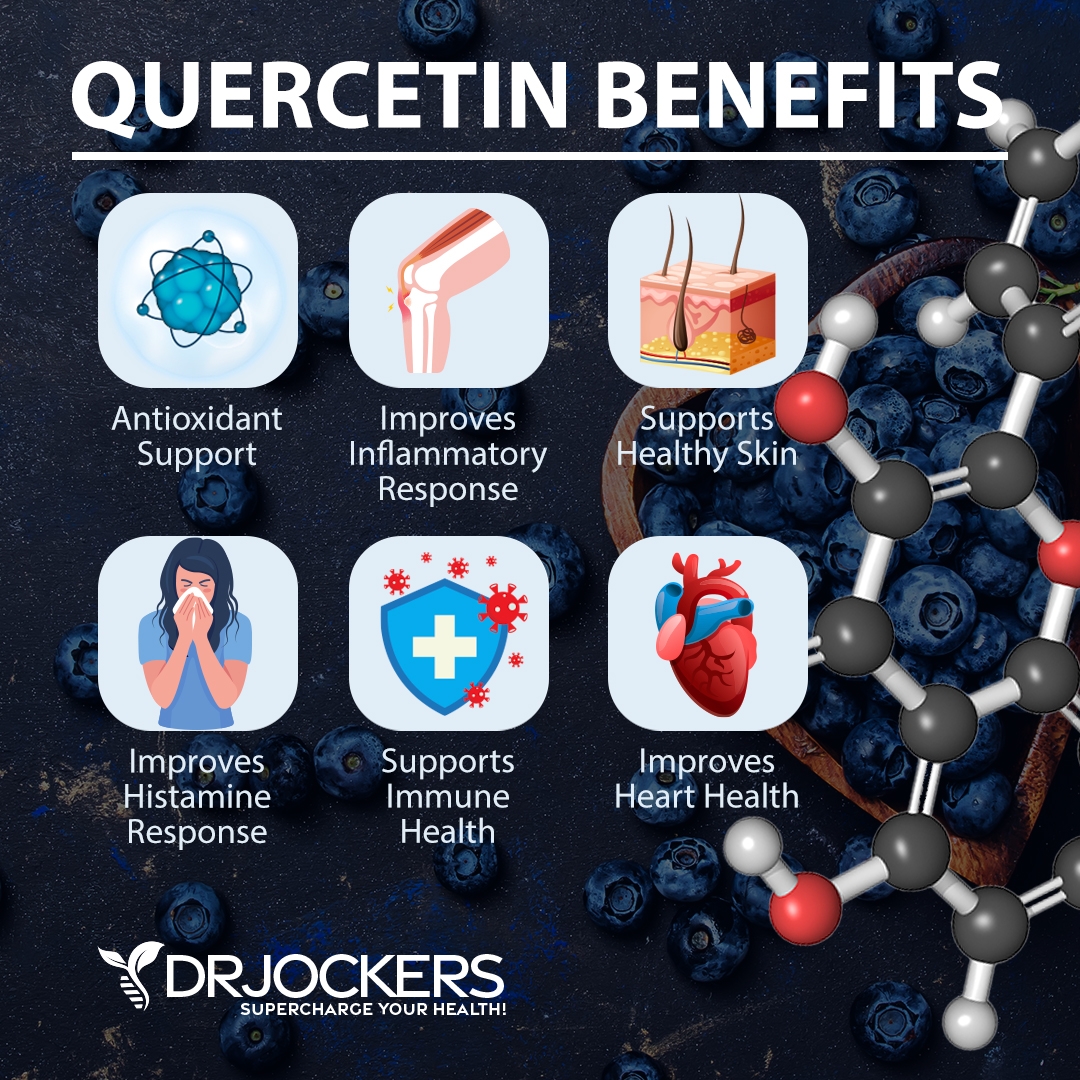
2. Curcumin
Derived from turmeric, curcumin can prevent chronic inflammation by controlling the inflammatory pathways which leading to tissue damage, histamine release, immune cell activation and digestive disturbances. Associated with improving the immune response of patients with autoimmune diseases in clinical trials, curcumin heals leaky gut in much the same way as does quercetin.
Curcumin regulates a healthy concentration of macrophages and does not interfere with the immune’s response to normal infections. Adding curcumin to your diet will equip your body with a powerful compound to scavenge free radicals and prevent tissue injury along the digestive tract. (1, 5) By reducing intestinal inflammation, curcumin helps to heal leaky gut syndrome.
Supplementing your diet with 1,000-2,000 mg of curcumin daily can be used to limit inflammation and enhance natural immunity (1). Add turmeric to meat marinades, homemade stews, sauces and even your coffee and smoothies for added antioxidant protection.
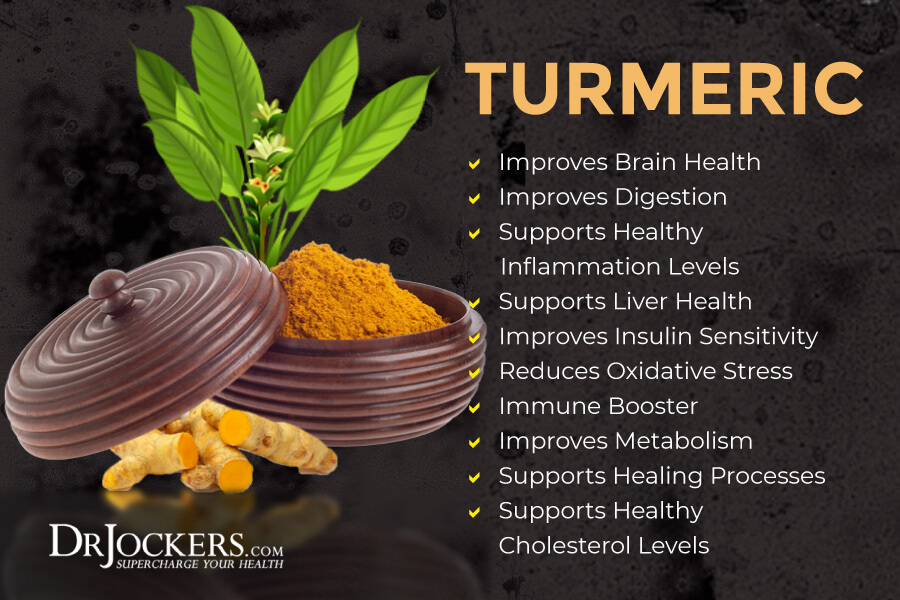
3. Zinc Glycinate and Zinc Carnosine
Phytates are found in our diets and are commonly viewed as anti-nutrients. Phytates found in foods like nuts can pull vitamins and minerals like Zinc out of the body’s stored reserves. Zinc glycinate is one of the most bioavailable forms of zinc because it is readily absorbed and retained. (6)
By improving the availability of zinc to the body, zinc glycinate is able to improve intestinal permeability and heal leaky gut. Patients with Crohn’s disease have successfully used zinc carnosine supplementation to decrease the ulcerations of the gut associated with leaky gut and support immune system function. (11)
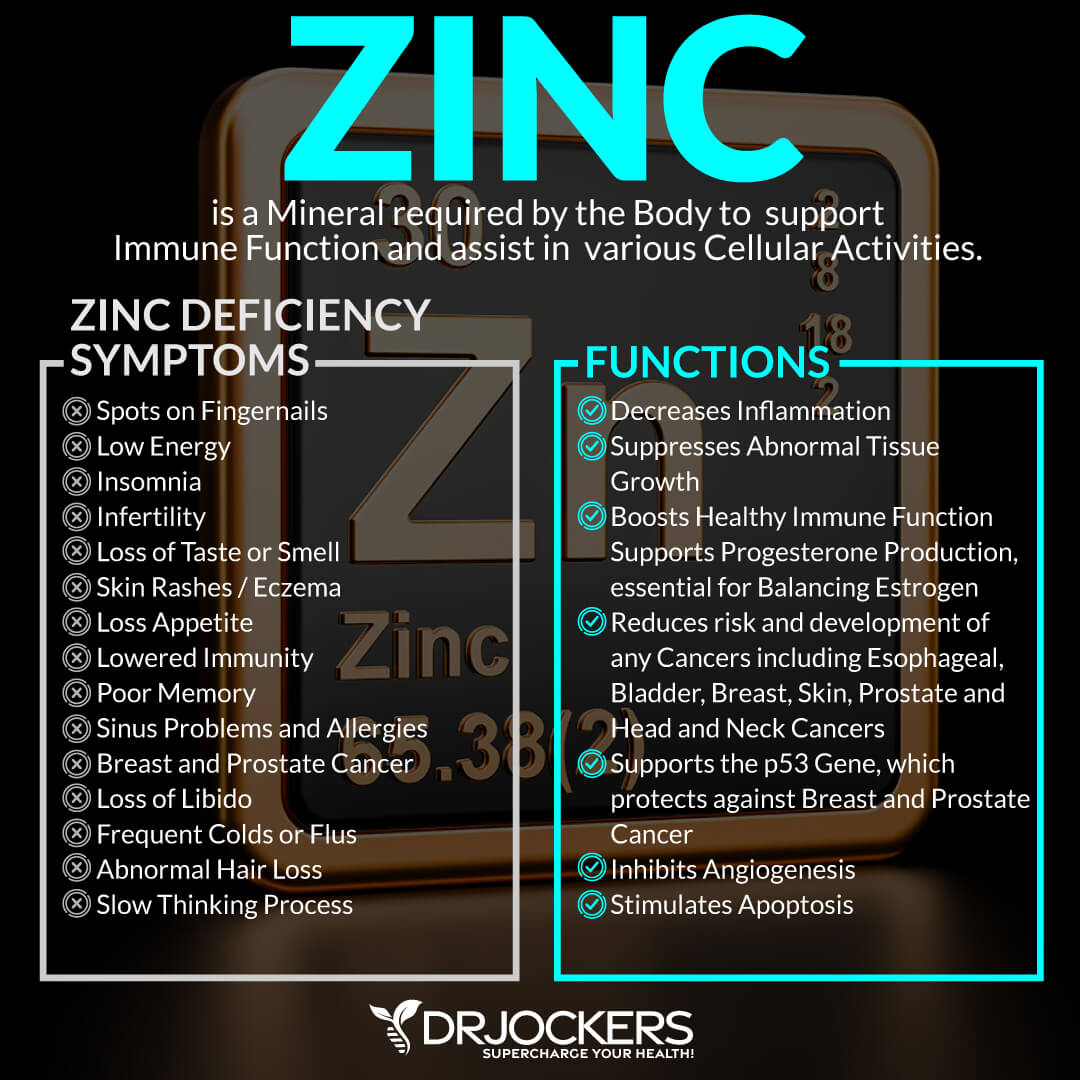
4. L-Glutamine
L-glutamine is the most concentrated amino acid stored in our plasma that is not considered essential, although this classification may soon change. This amino acid improves the digestive tract and stabilizes unhealthy immune responses while also reducing your sugar cravings. (7)
Patients with glutamine deficiencies have been found to have an altered T-cell response which impairs the immune system from fighting infection. Supplemental L-glutamine repairs mucosal cells that line the digestive tract acting as an antioxidant crucial for maintaining the functionality and structure of the gut. (7, 12) This may be one of the most valuable supplements to heal leaky gut syndrome.
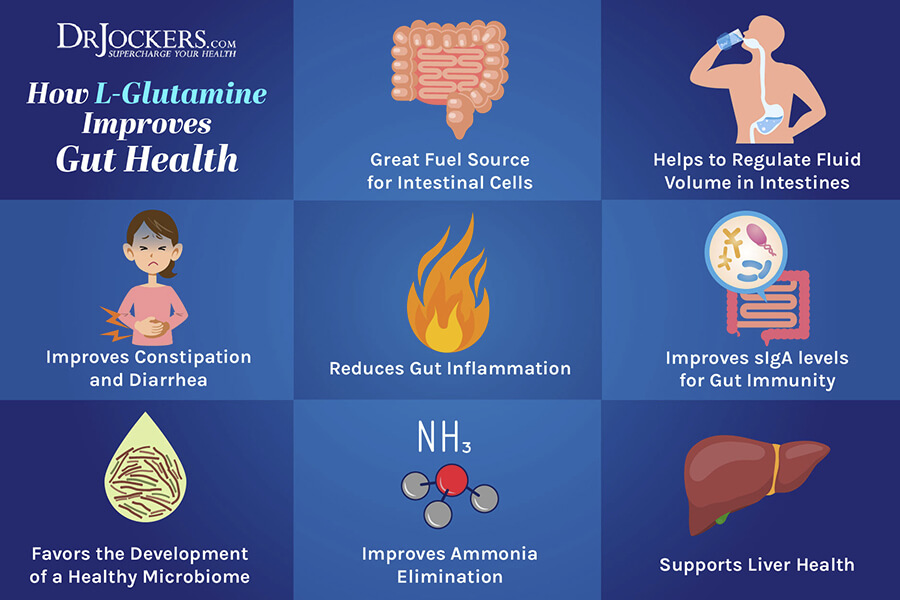
L-Glutamine for Leaky Gut
A common side effect of chemotherapy and radiation treatment for cancer patients, mucositis is the inflammation of the digestive tract caused by ulceration to this mucous lining. This breakdown of the gut’s structure promotes leaky gut as it increases gut permeability, risk of infection, increased growth of toxic bacteria in the gut and entering the blood and essential circulation to all parts of the body.
L-glutamine relieves pain associated with damage to the intestines and equips epithelial cells with the nutrients required to maintain the integrity of the GI tract improving wound healing. (7, 12) L-glutamine is also beneficial for collagen synthesis. Glutamine is partly broken down into proline which is essential for collagen production and ultimately contributes to wound healing and fortifying a strong gut barrier. (7)
5. Ginger
Sometimes referred to its active component, 6-gingerol, ginger exhibits comparable inflammation prevention control as do drugs like aspirin and ibuprofen (1). Ginger is a digestive stimulant that promotes gastric flow and contains enzymes which aid in proper digestion.
Ginger can be used to treat pain associated with intestinal inflammation by relieving contractions of the gut lining. For this reason, ginger has traditionally been used to treat nausea, relieve symptoms associated with a woman’s menstrual cycle and treat morning sickness. (10)
Individuals with leaky gut are likely to have an unhealthy balance of bacteria in their gut resulting from toxic foods and gut inflammation. Ginger exhibits powerful antimicrobial properties which not only make it an economical treatment but highly effective and natural antibiotic as well.
Ginger including powder and fresh ginger has been extensively found to combat strains of bacteria linked to leaky gut. Unlike synthetic antibiotics, ginger has been effective against both standard and drug resistant microbes in treating gastrointestinal infection. (13)
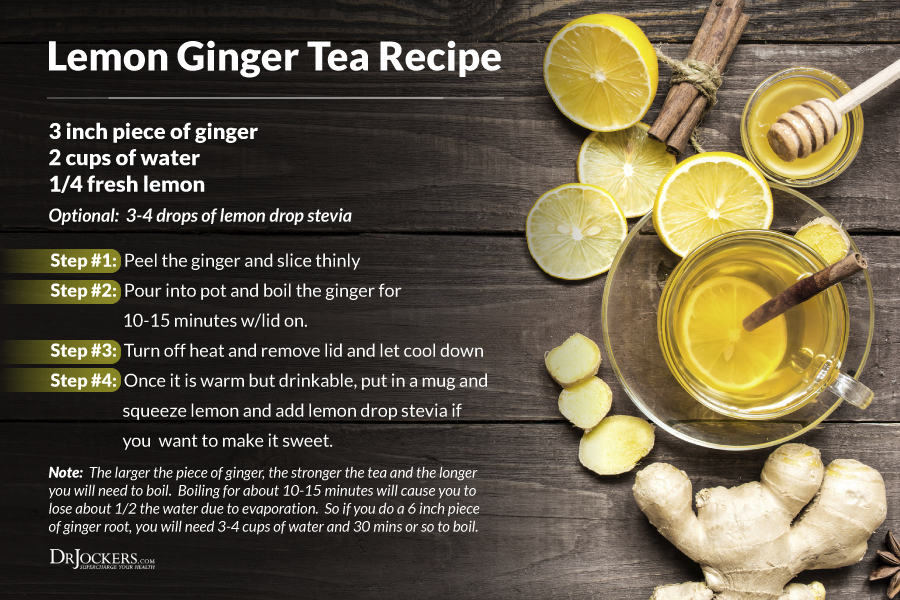
6. Glutathione:
Glutathione has been coined with the term “master anti-oxidant” due to its essential role in maintaining exogenous anti-oxidants such as vitamin C & E in their active form (14, 15). Glutathione is like the cell’s security guard protecting the genetic equipment from outside attack.
It is estimated that each cell in the body withstands 10,000 hits by free radicals each day. Glutathione disarms these free radicals before they wreak havoc and cleans up the oxidative stress related damage that has occurred.
Glutathione helps protect the intestinal lining, reduces inflammation and optimizes the gut mediated immune system. Studies have shown that glutathione strengthens T cells which are critical for modulating the immune system appropriately (16). Compounds that help support glutathione levels include N-Acetyl Cysteine (NAC), alpha lipoic acid and selenium.
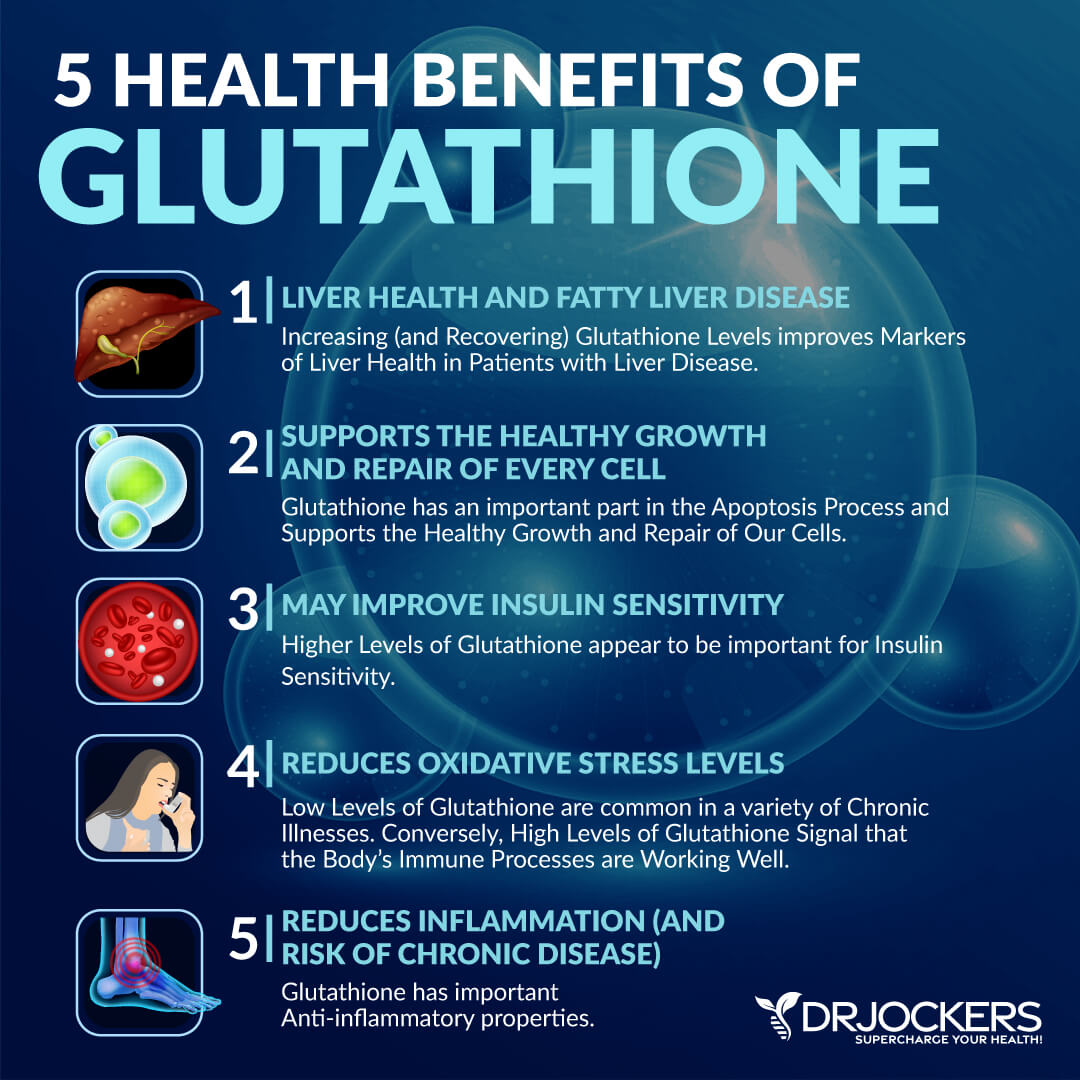
Bonus: Pea Protein
A high quality protein less common to trigger digestive complaints is pea protein. Pea protein is a vegan protein and a great alternative to soy and dairy based proteins. Its protein content is comparable to the high protein content of animal based proteins and is less inflammatory than whey or casein. It is also lower in lectins than other forms of vegan protein.
Pea protein is great for individuals with autoimmunity and food sensitivities. It not only provides a great source of energy but can suppress appetite as well. (9) This protein is also one of the best foods for improving the microbiome as the pea fiber acts as a prebiotic to preferentially favor the development of healthy microbes such as bifidobacterium. It also helps to raise up short-chain fatty acid production in the gut, which reduces inflammation and helps the body heal leaky gut. (17).
Summary
Heal your gut by ridding of the toxic and inflammatory foods which promote leaky gut. Restoring your body to its proper digestive health better allows the gut to naturally repair and heal itself. Applying these nutrients that heal leaky gut syndrome that we listed above will help you stop chronic inflammation and improve your quality of life.
I use a product called Gut Healing Protein that contains all of these nutrients and more in clinically effective dosages. The protein powder tastes wonderful, is sugar free, xylitol and stevia free, using the low-glycemic lao han extract (monk fruit) as the sweetening agent.
Using this product, I have seen much faster results at reducing gut induced inflammation and helping the body heal leaky gut. I recommend this for individuals with autoimmunity, adrenal fatigue and/or chronic inflammatory issues.
Inflammation Crushing Ebundle
The Inflammation Crushing Ebundle is designed to help you improve your brain, liver, immune system and discover the healing strategies, foods and recipes to burn fat, reduce inflammation and Thrive in Life!
As a doctor of natural medicine, I have spent the past 20 years studying the best healing strategies and worked with hundreds of coaching clients, helping them overcome chronic health conditions and optimize their overall health.
In our Inflammation Crushing Ebundle, I have put together my very best strategies to reduce inflammation and optimize your healing potential. Take a look at what you will get inside these valuable guides below!
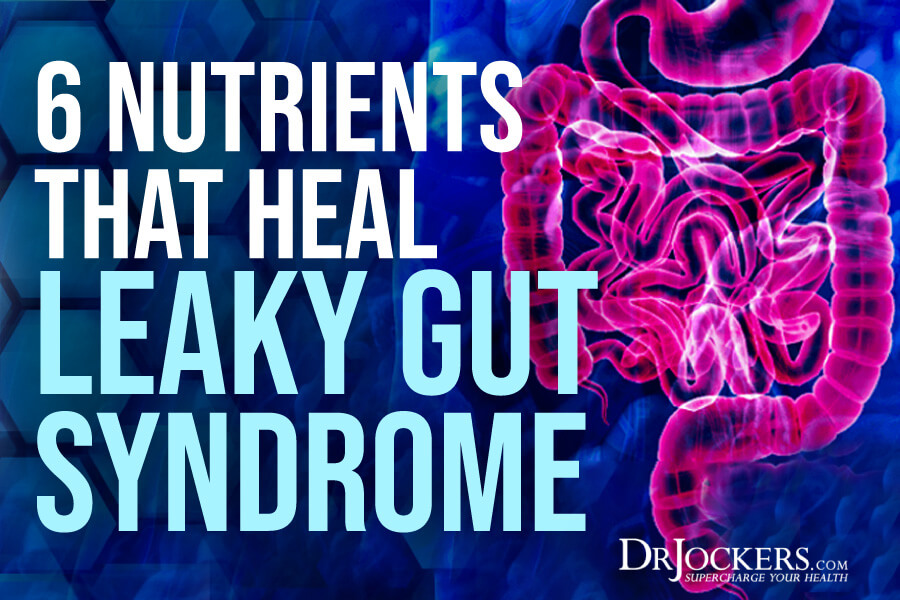




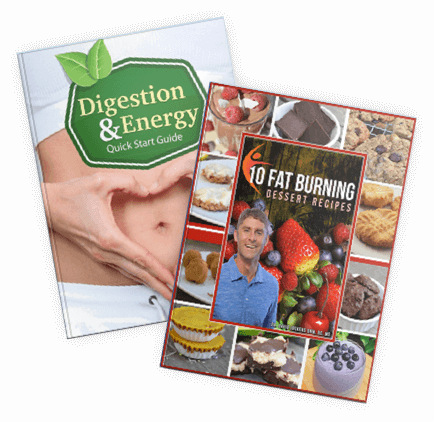

Dr. David, Congratulations on your beautiful family!!!!! You are truly on the fast track!!!
I am healing from a rotator muscle tear and searching for a new protein source. Your Gut Healing Protein sounds great for me and so many of my patients. Do you have some sort of wholesale program to provide to others who want to provide this in the office to patients? Please let me know ASAP so I can get started on it now in my healing time and later for maintenance.
Hey doc,
Thanks so much! Sorry to hear about your rotator cuff. Yes, you can email support@drjockers.com and order case quantities for 25% off.
Are you saying we shouldn’t eat nuts? I’ve been eating Brazil nuts and Almonds now for a long time for Hashimotos.
Harriett,
Yes, I usually will do an elimination diet protocol where we take people with autoimmune diseases off of all nuts for 4-6 weeks and then slowly add them back in one at a time and see how they respond. You can read more about this here: https://drjockers.com/5-steps-to-following-an-elimination-diet/
Dr. Jockers,
should coffee be eliminated while working on healing the gut, or autoimmune disorders? I was drinking two cups per week, and I stopped drinking it seven weeks ago. So now I wondering if this small amount would be OK to drink.
thank you so very much for your posts and your replies. Cathy
Thank you for that list of helpful foods, Dr. I was wondering, though, if Zinc Glycinate is inherently better than Zinc Picolinate. I have a bottle of the latter and that is what I give to my family. Also, I don’t always grasp the difference between turmeric and curcumin. Do we have to take the supplemental form? Or only people with leaky guts? Thanx.
Hi Samia, Both are good forms of zinc. Curcumin is the antioxidant that gives turmeric its rich color. Curcumin, from turmeric, has powerful anti-inflammatory properties that can benefit everyone. In this article I explain the benefits of taking supplemental curcumin: https://drjockers.com/10-benefits-turmeric/
@Dr. Jockers. Many thanks for your info.
DR. JOCKERS
WHAT IS THE AMOUNT OF PEA PROTEIN WE SHOULD TAKE EVERY DAY ALONG WITH THE OTHER ?
THANK YOU
I would recommend doing at least one full serving – 15-30 grams daily!
Dr. Jockers, what do you recommend for people with autoimmune diseases that try to avoid legumes ( and implicit the lectins)?! Can be switched the pea protein with the hemp protein and still seeing the benefits?! Thank you.
I would recommend collagen or bone broth protein. https://store.drjockers.com/products/bone-broth-power-protein?_pos=1&_sid=778483d94&_ss=r
I have IBS and other gut issues. How do you diagnose leaky gut?
Hello Melody, here is a helpful article on this https://drjockers.com/leaky-gut-syndrome/
Dr Jockers
Please refer to research done by Dr Zsofia Clemens PHD from Hungary on this topic.
She and her research team are healing leaky gut and intestinal permeability with a special diet.
The diet contains Meat, Organ Meat and Good Fats.
Thank you for sharing!
Just be aware that L-Glutamine feeds cancer cells. If you already have cancer, you must stop all gluclose and restrict L-Glutamine. Dr Thomas Seyfried describes cancer as a metabolic disease where cancer cells do jot use oxygen as energy but are in a fermentation environment. What does the process of fermentation require?